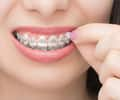1. Did you suck your thumb as a child?
- Yes
- No
The American Association of Orthodontists (AAO) recommends scheduling a consultation with an orthodontist if you sucked your thumb or any fingers as a small child. If you continued a thumb sucking habit after age 5, it might have had an effect on the formation of your adult teeth, according to the University of Arkansas for Medical Sciences.
2. Do you have trouble chewing or biting?
- Yes
- No
Difficulty chewing food or biting down can be a sign of malocclusion, or teeth that aren't aligned correctly, notes the National Institutes of Health. Braces can often help correct a misaligned bite, making it easier for you to chew and bite down.
3. Did you lose your baby teeth early?
- Yes
- No
The average child starts to lose their baby teeth around age 6, as the American Dental Association points out. If you lost your baby teeth significantly before then, it could be a sign that you may need braces, according to the AAO.
4. Did you lose your baby teeth late?
- Yes
- No
Just as losing your baby teeth early can be a sign that you may need braces later on, so can losing your baby teeth later than average, the AAO notes.
5. Are there gaps between your teeth?
- Yes
- No
Orthodontic treatment can help to treat diastema, or larger-than-average spaces between the teeth. As the AAO explains, having gaps between the teeth can make it easier for food to get stuck in the spaces and can increase your risk of cavities or gum disease.
6. Do your teeth overlap?
- Yes
- No
If there is not much space in your jawbone or if you have large teeth, it can appear as though you have crowding in your mouth. In some cases, the teeth may overlap, too, which can make it difficult to clean between them. As the AAO notes, overcrowded teeth can be more likely to develop cavities and may benefit from correction.
7. How old are you?
- Under age 7
- Between ages 7 and 14
- Over age 14
The AAO recommends seeing an orthodontist for a consultation by age 7, or as soon as you or your parents notice any issues with your teeth or bite, such as spacing, overcrowding or misalignment. According to the Mayo Clinic, the ideal time for braces is between the ages of 8 and 14, after you've lost most of your baby teeth and have many of your permanent teeth. If you're older than 14, it's still not too late to see an orthodontist and get braces if you need them.
How Did You Do?
If you (or your child) answered "yes" to any of the first six questions above, it may be a good idea to schedule a consultation with an orthodontist to see if braces could correct your teeth or bite and give you more confidence in your smile.
During that first visit, an orthodontist will do a dental examination of your teeth, determine how your bite is, take a panoramic x-ray and answer any questions you or your parents have. They'll let you know what their recommended treatment is, about how long treatment will take and how much braces will cost.
This Do I Need Braces quiz is just a starting point. Your family dentist and orthodontist can help you figure out your next steps and ensure you get the best treatment for your smile.
Oral Care Center articles are reviewed by an oral health medical professional. This information is for educational purposes only. This content is not intended to be a substitute for professional medical advice, diagnosis or treatment. Always seek the advice of your dentist, physician or other qualified healthcare provider.
ORAL HEALTH QUIZ
What's behind your smile?
Take our Oral Health assessment to get the most from your oral care routine
ORAL HEALTH QUIZ
What's behind your smile?
Take our Oral Health assessment to get the most from your oral care routine
Join Us
Get the best of your oral health routine and take it to the next level with expert advice, recommendations, products and solutions and special offers.
Join Us
Get the best of your oral health routine and take it to the next level with expert advice, recommendations, products and solutions and special offers.















